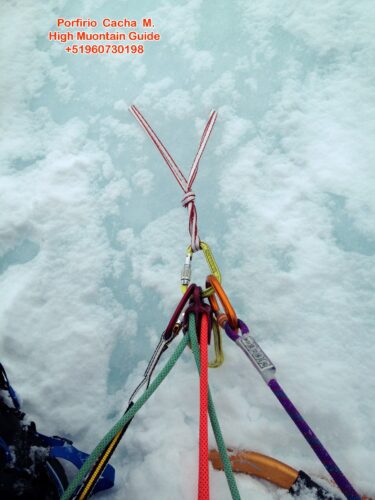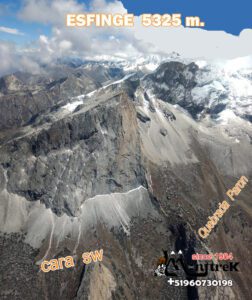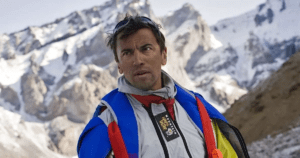THE CREATION AND TECHNIQUE OF ABALÁKOV
It was invented by the older brother Vitali and helped by Yevgeni Abalakov, who revolutionized climbing in Russia and later worldwide. Currently the technique is used in double, horizontal and vertical for greater safety, and is used to anchor or to create a descent route (rappelling) when the climber cannot find any reliable anchorage nearby or lacks ice screws, etc.
They also invented: backpacks with a rigid structure, rescue stretchers, the first sketches of mechanical cams (Friends), as well as prostheses for amputee athletes, and many other inventions.
THE UNKNOWN HISTORY OF THE SOVIET ALPINISTS
VITALI & YEVGENI ABALÁKOV
The early death of their parents forced the two brothers to grow up in the city of Kanoyarsk, divided by the Yenisei River, in the southern part of Siberia, with their uncle Ivan Abalákov. The Abalákovs were considered unrecognizable enemies of the people for representing everything that the Bolsheviks wanted to eradicate from extensive Russia. One night of eternal Siberian winter, some town police knocked on the door (in the revolutionary events that had been happening in the country since 1917) and with a few blows they opened the door of the Abalakov family to arrest them, which was the communist nightmare. The Abalakov brothers escaped through the mountains thanks to their knowledge of mountaineering and reached Germany and Austria.
The Abalákov brothers' first major failure occurred while climbing Khan Tengri, located in the Tian Shan mountain range, on the border between China, Kazakhstan and Kyrgyzstan. This climb caused the death of a member of the expedition and cost Vitali four phalanges of his hands, already useless when they managed to reach the camp.
The Khan Tegri disaster was a hard blow for the brothers, especially for Vitali, who abandoned the mountain and applied his knowledge of chemical engineering to the manufacture of prostheses that improved the situation of those from whom, like him, the mountain had taken some member. He was precisely at the factory when NKVD agents arrested him. The year was 1937, historically framed in the time of the great terror and the great Stalinist purges; A comrade from the heights accused him of being a reactionary and a spy for capitalism, that is, a traitor to the cause of the people in every way. Vitali was subjected to all the tortures of the moment, until his body could no longer bear it and, according to the author of the book, he accepted the false guilty plea previously concocted by the NKVD agents: “At the time of the Stalinist purges , being a well-known person like the Abalákov brothers was very dangerous. It is unknown why Vitali was imprisoned and his brother Yevgeni was not; It is curious that they did not ask Vitali to frame his brother. While Vitali suffered in Lubyanka, his brother continued his passion in the Caucasus mountains, since that year there were no major expeditions to the countries of Central Asia. Yevgeni continued to climb and 11 years after Vitali's imprisonment, in 1948, Yevgeni was found dead in the bathroom of Dr. Belikov's house; his family's version is that he was murdered. I am sure that was not the case, although his son defended the version of the murder. This paranoia is understandable, the NKVD murdered without leaving a trace; Furthermore, Russians really like stories about crimes and plots, says Cédric Gras.
HARD BLOW FOR SOVIET MOUNTAINEERING
Yevgeni's death was a hard blow for Soviet mountaineering, he was the great hero of the mountains, there was a feeling of orphanhood among the mountaineers that the older brother had to make up for with his communist fervor and his ingenuity. Vitali climbed occasionally, but he continued to prepare future climbers in camps, continued designing gadgets and writing climbing manuals, which formed his canon of the Soviet climber.
Mount Everest offered resistance to the brothers; it was not until May 4, 1982 that a Soviet expedition reached the summit. In the 60s, the divorce from Chinese-Soviet communism occurred. The northern pass was closed to Soviet mountaineers; They had to ask permission from Nepal, but the bureaucracy was very slow, and while this was happening the Soviets lost interest in mountaineering as a discipline. Furthermore, Everest was in high demand and other climbers of other nationalities had already conquered it. However, the Soviet climbers who achieved that milestone were welcomed in the USSR as true heroes. In the entourage that received them, there was an older but robust Vitali. He died four years later at the age of 80, glad to know that at least among that small, marginalized group of mountaineers, his exploits and inventions had contributed to the Soviet effort to touch the roof of the sky.
Book by Cédric Gras (Editorial Crítica).




